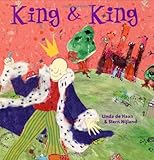-

 Your response to those who believe that early childhood centers should avoid the inclusion of books depicting gay or lesbian individuals such as same-sex partnered families
Your response to those who believe that early childhood centers should avoid the inclusion of books depicting gay or lesbian individuals such as same-sex partnered families
If I had to meet with a group of individuals who believed that early childhood centers should avoid the inclusion of books depicting gay or lesbian individuals such as same-sex partnered families, I would began by educating the group on diversity to include same-sex partnerships. I would explain that it is better to educate the children by giving them the correct answers than to leave the questions unanswered and open for speculations. Pelo (2008) stated “When we make lesbian-and-gay headed families visible in our programs, our emphasis is on relationships—who people love and how people form families; sex and sexuality are not our focus” (p. 180). I would encourage the individuals to help select the books for the classroom so that they can monitor what is being viewed by the children as well as provide them the opportunity to be a part of the decision to include the books in the classroom.
- If you have ever used or heard homophobic terms such as "fag," “gay,” “homo,” "sissy," "tom boy," or “lesbo” as an insult by a child toward another child? Or, by an adult toward a child? Describe what occurred. How might these types of comments influence all children? (Note: if you have not had a personal experience ask a family member, friend, or colleague)
I have a friend, who was a victim of homophobic slurs as he was growing up. Some individuals used to refer to him as a book worm because he always had his head in a book and mostly stayed to himself. His uncle used to tell him he was going to grow up to be a fag because he didn’t act the way he thought boys should be acting at his age. Fortunately, he was blessed to have someone in his life to teach him how to resist these and other bias remarks and continued on to live a successful life. Just like my friend, these types of comments will make any child believe this to be true if they do not have a caring adult in their life to ensure healthy development is taking place. These children usually lose their self-esteem and become withdrawn because they may feel self-hate and self-restricted. Derman-Sparks & Edwards (2010) stated “Social realities either support or harm children’s beliefs about their families, about others, and about themselves” (p. 13).
References
Derman-Sparks, L., & Olsen Edwards, J. (2010). Anti-bias education for young children and ourselves.
Washington, DC: NAEYCPelo, A. (Ed.) (2008). Rethinking early childhood education. Milwaukee, WI: Rethinking Schools.